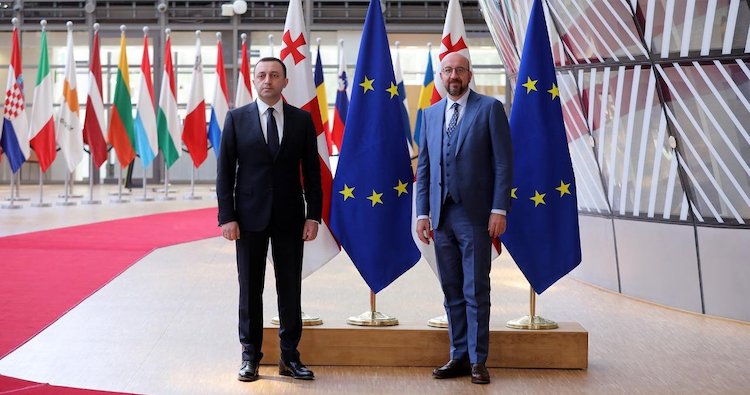
Georgia Claims Pole Position Among Eastern European EU Aspirants
Georgia Claims Pole Position Among Eastern European EU Aspirants
On June 3, at the Global Security Forum, in Bratislava, Georgian Prime Minister Irakli Garibashvili declared, “I will say without exaggeration that Georgia has always been a leader among Eastern European countries.” He added that Georgia had done its homework on joining the European Union, and now it was the EU’s turn (Facebook.com/GaribashviliOfficial, June 3). While shifting the responsibility for resolving the issue of Georgia receiving candidate status to Brussels, Garibashvili asserted that, in all respects, Tbilisi was ahead of fellow EU aspirants from the former Soviet space—Kyiv and Chisinau (Facebook.com/GaribashviliOfficial, June 3). Yet the European Union Delegation to Georgia has expressed some reservations. Several days earlier, the head of the EU mission in Tbilisi, Ambassador Carl Hartzell, agreed that the Georgian authorities had reason to be proud of their achievements, which earned the country the informal title of “leader” of the Eastern Partnership (EaP). But on the other hand, the pace of Georgian reforms had stalled, and the EU was increasingly concerned about the country’s current trajectory (Amerikiskhma.com, May 30).
Georgia’s ruling elite denies any such problems. The chairperson of the governing Georgian Dream (GD) party, Irakli Kobakhidze, also claimed that the country had already fulfilled 45 percent of the obligations assumed under the association agreement with the EU, putting it ahead of not only the other two EaP aspirants but even some countries that already have candidate status (Facebook.com/KobakhidzeOfficial, May 30). Meanwhile, the speaker of the parliament of Georgia, Shalva Papuashvili, told a group of students he met with on June 3 that, “The Georgian people have been fighting for their perspective for 30 years, and right now the moment of truth has come for the EU, when the EU must see and properly appreciate this approach and the struggle of the Georgian people and the State” (Edu.aris.ge, June 4). Such defiant statements by the Georgian leadership inadvertently reveal that the authorities already realize the possibility that the EU may end up rejecting the country’s membership application, and they are looking for others to blame—both in Brussels and among the domestic opposition.
Concern in the corridors of power in Tbilisi grew after the Centre for European Policy Studies (CEPS), a leading think tank based in Brussels, published an article last month entitled “Georgia’s Dubious Application for EU Membership” (Ceps.eu, May 20). The authors of the piece call Georgia’s path toward the EU a “paradox.” After the piece came out, Georgia’s ruling elites lined up to preemptively reproach Brussels in case of a negative answer on candidacy status. The chairperson of the Georgian parliament’s Committee on Foreign Affairs, Nikoloz Samkaharadze, along with his deputy, Giorgi Khelashvili, responded by writing an op-ed, “Georgia Should Become a Candidate for EU Membership,” in which they call the CEPS article “a highly disappointing opinion piece, riddled with inaccuracies, contradictions and based on hearsay” (EurActiv, June 2). The deputy chairperson of GD’s parliamentary faction, Beka Davituliani, in turn said that if the EU does not open its door to Georgia, this automatically means that “the West is leaving the Caucasus region, scared” (Tvpirveli.ge, June 3). Georgian Dream head Kobakhideze considers the formal granting of EU candidate status an act of solidarity toward the countries under occupation by Russia, as well as recognition that the EU is not afraid of Russia’s reaction. Thus, he noted, “the EU should not send the opposite message” (Facebook.com/KobakhidzeOfficial, May 30).
Considering that many questions may arise in Brussels regarding the state of Georgia’s democratic institutions (see EDM, November 15, 2021 and December 15, 2021), the authorities in Tbilisi are proactively trying to disconnect the issue of EU membership from the political processes inside Georgia and are framing it for outside audiences purely in geopolitical terms. In Bratislava, Prime Minister Garibashvili warned that if the EU fails to bestow candidate status on his country, only Russia will be happy about this (YouTube, June 4).
At the same time, Georgia is well aware that the accelerated process of applying for European membership was made possible by the large-scale war in Ukraine; and so the Georgian head of government reminded the audience at the Global Security Forum that before Ukraine, Georgia had twice fought a war with Russia. At the same time, Garibashvili rhetorically diminished the importance of candidate status as only “symbolic” (YouTube, June 4), effectively echoing sentiments expressed earlier by GD leader Kobakhidze, who stressed that becoming an EU candidate will bring no additional financial support for Georgia (Facebook.com/KobakhidzeOfficial, May 30). In other words, the Georgian authorities, unable to boast of their country’s reforms, are instead trying to present Georgia as a repeat victim of Russia that deserves EU candidate status as some sort of symbolic consolation prize. The reason for this deliberate change in emphasis can be found squarely within the context of Georgia’s domestic political struggle.
While the entire country awaits the historic decision of the EU, there is broad recognition domestically that the stability of the ruling government in Tbilisi will depend on a positive signal from Brussels. The authorities already fear that if Georgia is refused candidate status, the opposition may launch mass protest actions to try to overthrow the government. Moreover, the authorities claim that the opposition is attempting to dissuade Georgia’s European partners from supporting EU candidate status for the South Caucasus country (Facebook.com/KobakhidzeOfficial, May 30). In reality, there is absolute consensus among the Georgian opposition regarding joining the European Union. Yet should Brussels return a negative response, GD’s reenergized political rivals at home will surely mobilize the masses under the pretext of protecting Georgia’s long-term European perspective.


